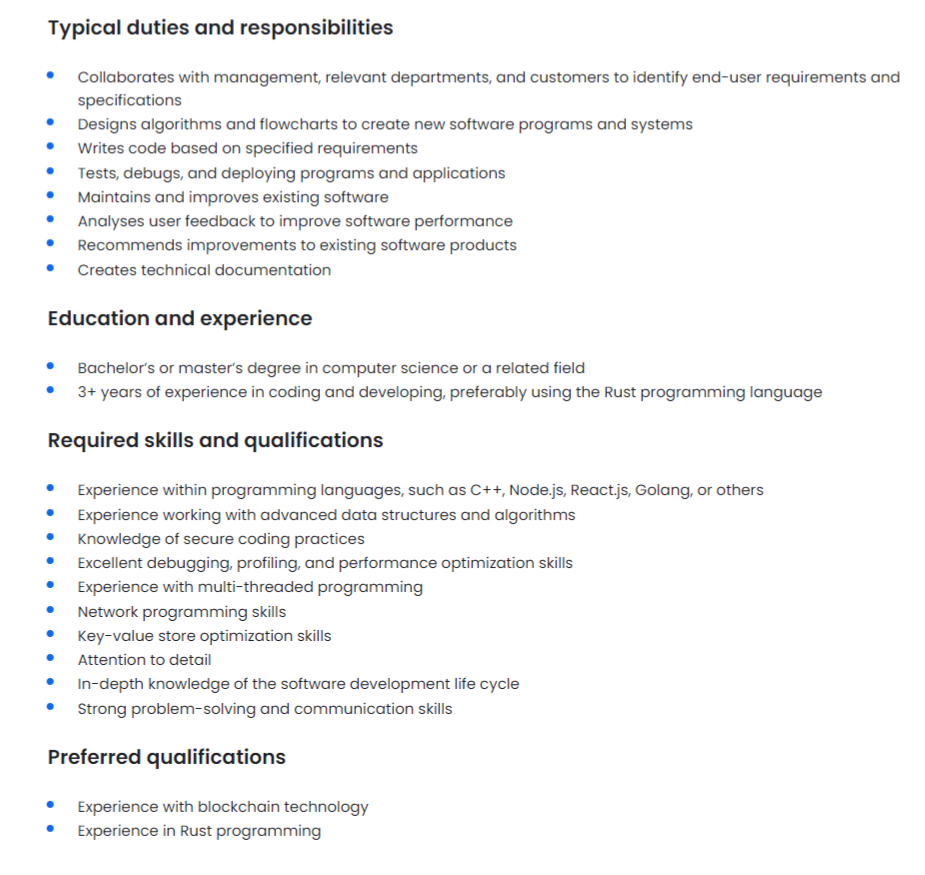The Ultimate Guide to Hire Rust Developers for Your Team
Blazing speed or advanced safety? With Rust, you don’t have to choose. It is a modern programming language that was created with a focus on performance, safety, and memory management. Being a more reliable and safer alternative to C++, Rust allows developers and company owners to build solutions capable of handling large amounts of data volumes without sacrificing runtime performance and memory safety.
Rust’s adoption by such world-known companies as Dropbox, Mozilla, Cloudflare, Brave, Discord, and more proves once again that it is a go-to language for building modern apps. For instance, Dropbox used Rust to improve the performance and security of its storage systems, while Discord switched from Go to Rust to fix large latency spikes and enhance user experience. Learn more about industries and companies that use Rust in our recent article:
Finding the Perfect Fit: Select Go or Rust for Different Industries Wisely
But though Rust is one of the two (together with Kotlin) fastest-growing language communities based on the State of the Developer Nation Report, finding skilled Rust developers is not simple. As a global recruitment company, we at Bridge have experience in hiring Rust engineers globally and will be happy to share our knowledge with you. So keep reading, as we’re about to dive into details.
The most common ways to hire Rust programmers
Searching for Rust engineers, you have plenty of options to choose from, including hiring talent in-house, sourcing, staffing, and more, and can pick the one that suits best your project needs and objectives.
Hiring International Employees to a Tech Company: 5 Best Options
Let’s take a closer look at the most popular hiring approaches you can opt for to build a high-performing team.
Sourcing-as-a-service
Candidate sourcing services are a perfect fit for companies that need to speed up the hiring process, but still want to interview candidates on their own. Here are some details to better understand how it works based on our experience.
First of all, the client sends us their requirements regarding an engineer they are looking for. Using our proprietary sourcing engine, our sourcing team starts looking for potential hires and identifies an exact talent pool matching the client’s needs. Next, we thoroughly screen candidates’ profiles and vet their skills to gather a list of the best applicants for hire. As a rule, we source from 15 to 30 pre-screened candidates per month. As an example, when partnering with Obvious.ly, we sourced 5-10 expert engineers weekly.
What’s more, sourcing-as-a-service is one of the most budget-friendly options on the list since with agencies like Bridge, you only pay a monthly subscription fee, which is much cheaper than hiring a full-time recruiter.
Let’s sum up what benefits you get from choosing sourcing-as-a-service with Bridge:
| Pros | Cons |
| ✔️Speed up hiring with an automated data engine. | ➖ Interviewing and further onboarding are on you. |
| ✔️You get the first candidates within 5 business days. | |
| ✔️It’s cheaper than hiring a full-time recruiter. | |
| ✔️Manage your hiring campaign with our clients-only web platform. | |
| ✔️You get access to global tech talent. |
In-house hiring
When talking about hiring developers in-house, you are in charge of the whole hiring process, from writing a job description to conducting a final interview. So before opting for this approach, make sure you are ready to deal with it on your own as you may face numerous challenges on your way to finding the right candidate.
It’s not a secret that because of the pandemic and the rising competition for talent between companies, today the market experiences a global tech talent shortage, while the salaries of engineers continue to rise. What’s more, the hiring process can stretch for months. That’s why partnering with a recruiting company like Bridge might be an optimal solution in the long run.
Here are the pros and cons you get using this method.
| Pros | Cons |
| ✔️Full control over the hiring process. | ➖ You have to compete for skilled engineers. |
| ✔️You know each candidate in person from the very beginning. | ➖ It’s hard to handle all recruitment operations on your own. |
| ✔️You ensure 100% fit. | ➖ Hiring talent in-house is the most time-consuming option. |
| ✔️ Flexibility in adjusting the hiring strategy when required. |
Hiring freelancers
Partnering with freelancers is a cost-effective option that attracts companies looking to save their resources. On the one hand, collaborating with an engineer from platforms like Upwork, Indeed, or TopTal, and hire them for a specific project or task is indeed budget-friendly. But on the flipside, such an experience might negatively influence your project since freelancers usually work with several clients and, if something goes wrong, they may disappear without completing the task.
Without any prior experience in hiring freelancers, it will also be difficult to assess the candidate’s technical skills. So, opt for this strategy only if you have worked with freelancers in the past, or have specialists with the required tech expertise to help you assess potential hires.
Here are the advantages and disadvantages of hiring freelancers.
| Pros | Cons |
| ✔️Paying only for the job done, you will significantly cut costs. | ➖ Freelancers act like independent subcontractors with no further commitment. |
| ✔️You can easily adapt to changing workloads by hiring only for a specific task. | ➖ It’s difficult to evaluate candidates’ skills unless you are a tech expert yourself. |
| ✔️You don’t need to handle administrative operations, like taxes, insurance, and more. |
Outsourcing
Outsourcing is a traditional way when talking about software development that involves getting a full-fledged development team instead of looking for individual engineers for your in-house team. In this case, you are free to choose a partner from the global market of outsourcing vendors and build a Rust development team in accordance with your project requirements. Besides, you can significantly reduce expenses by collaborating with an outsourcing vendor from abroad.
Yet, outsourcing comes with some challenges. For instance, you can’t fully control the project and manage all the processes. Also, if an outsourcing company is located in a different time zone, it might negatively impact communication and teamwork. Moreover, sharing sensitive information with external vendors may pose security and confidentiality risks. And finally, let’s not forget about hidden expenses that might not be immediately apparent.
Let’s briefly mention the pros and cons of outsourcing below.
| Pros | Cons |
| ✔️You get access to niche expertise. | ➖No full control over the project. |
| ✔️Possibility to cut costs by hiring an offshore agency. | ➖Hidden costs. |
| ✔️Outsourcing can significantly save time on project development. | ➖Security and confidentiality issues. |
IT staffing
One more hiring solution you can decide upon is IT staffing. It is an easy way to expand your team fast and effortlessly. When you partner with Bridge, we can help you find extra Rust developers for short or long-term engagement. For a better understanding, let’s go into details.
Our sourcers validate the information in candidates’ profiles and assess their skills to select potential hires that fit into your culture. You remain in full control over the process. You can schedule interviews, communicate with developers, and do your own screening using our web platform.
Another perk is that we cover all the paperwork, team setup, and payroll. You will only pay a daily or monthly rate for the actual developer’s work.
Check out some other benefits as well as drawbacks you get with IT staffing:
| Pros | Cons |
| ✔️You can scale your team on demand fast. | ➖You will have to onboard and train new hires. |
| ✔️You get pre-vetted developers. | ➖It requires more time to find the right fit when compared to sourcing. |
| ✔️You reduce expenses by paying only a rate for the developer’s work. | |
| ✔️You eliminate hidden costs and overheads. | |
| ✔️You get the right talent within days. |
With so many options available, it might be hard to choose the right hiring model. For your convenience, we’ve prepared a checklist that will help you pick a model suitable for your particular business case.
How to choose the right hiring model
Here are some key things to consider when choosing a particular hiring strategy.
Hire Rust developers on your own (in-house developers or freelancers) if:
✅ You need to close one or two roles.
✅ You are a Rust engineer or have the required technical background.
✅ You have enough time to manage the hiring process on your own.
✅ You have previous experience in hiring tech talent.
Team up with an outsourcing vendor if:
✅ You need a full-fledged development team.
✅ You don’t have time to participate in the project development.
✅ You are a business owner without technical background and expertise.
✅ You need to assemble a dedicated team fast, eliminating time-consuming hiring operations.
Consider IT staffing if:
✅ You need to extend your team with a Rust developer for long-term or short-term engagement.
✅ You are planning to extend your in-house team in the future.
✅ You need qualified hiring assistance but want to control and participate in the process.
✅ You expect a transparent hiring budget, without overheads and hidden costs.
Choose sourcing-as-a-service if:
✅ You are looking to quickly find suitable candidates globally.
✅ You need a list of pre-vetted candidates for current or future hires.
✅ You want to optimize your hiring costs.
✅ You’d like to have full control over your hiring campaign.
Now, let’s move on to expert advice on how to succeed in hiring Rust programmers.
Extra tips for hiring Rust developers
If you decide to deal with hiring Rust devs on your own nevertheless, we’re happy to help you with some expert tips to achieve the best possible results. Take a look below.
Write a clear job description
Your first step on the way to finding a good expert is creating a Rust developer job description, including responsibilities, skills, experience, and more. Depending on the project, a Rust coder might be responsible for integrating third-party systems, troubleshooting and debugging existing software written with Rust, creating technical documentation, and performing other project-related tasks.
When it comes to Rust developer skills, the list includes proficiency in Rust, like understanding the Rust concurrency model and most popular frameworks/libraries, familiarity with its tools, and more. Such a role also requires knowledge of other low-level programming languages such as C or C++ and expertise in web development.
For a better understanding, here is an excerpt of a Rust developer job description.

Prepare relevant Rust interview questions
After you shortlisted candidates, get ready to interview them. Make sure you have questions for assessing hard and soft skills. For example, to evaluate the candidate’s personal traits, you may ask the following questions:
- How do you handle negative feedback and criticism?
- Can you describe a situation when you made a decision under pressure?
- How do you prioritize your tasks when you have several deadlines?
- How do you deal with a situation when your colleagues disagree with you?
Here are possible questions to evaluate technical skills:
- How is match expression used in Rust?
- What is the difference between a trait bound and a where clause?
- What are the types of closure capture in Rust?
- What is the type parameter in Rust?
As you can see, it might be tricky to assess the candidate’s competency in case you have no prior experience in recruiting Rust devs. When needed, you can find some help at Bridge. We work with recruiters who understand the technology and thoroughly screen each candidate to validate their expertise and technical skills.
Define an optimal salary range
According to the Stack Overflow Developer Survey, an average Rust developer salary is around $87,000 a year. However, a Rust coder in the USA might earn up to $131,000 depending on the seniority level and location. That’s why you should clearly define what kind of expert you need and your hiring budget. In case you need more details on the salary ranges and market rates for Rust developers, read our related article:
Rust Developer Salary: How Much Do the Top-Paid Tech Experts Earn?
Unfortunately, the above-mentioned recommendations don’t cover the hiring process from start to finish, so get prepared to deal with some additional challenges. But all in all, if you feel like you could use some help, Bridge is here for you.
Hire top Rust developers with Bridge
It’s more than possible to hire Rust developers on your own, but be ready to deal with fierce competition and unexpected costs. Bridge can make this process fast and trouble-free for you. With years of experience in recruitment and hiring, we know the possible hiring challenges and how to eliminate them. We will make sure you get the most fitting Rust candidates and fill in your talent gaps.
Send your requirements to us and we will start sourcing for Rust developers right now.



